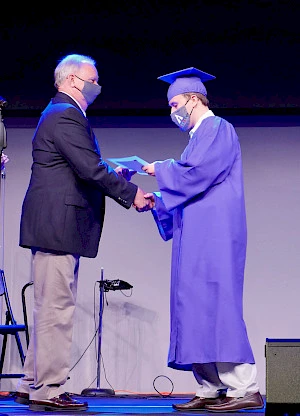Finding the Key to Warren’s Future: His Journey to Independence

At three years old, Warren’s mother took him to the park to play. While comparing notes during small talk with the other moms, it became clear to Clarke that her son, nonverbal at the time, needed a little extra help. “I was explaining all about Warren and his language delays to my friend, and she said ‘It sounds like he has apraxia,’” remembered Clarke. “I went home and looked it up online.” That same friend told Clarke about ACCESS. Clarke made the call, and that’s how it all started.
“All I could feel when we found ACCESS was just relief,” said Clarke. “I knew this was the greatest thing for Warren - a one-stop shop where he could get his education and all of his therapy together.”
Warren started at ACCESS due to speech delay, but through a variety of evaluations over the next few years, he was also diagnosed with autism spectrum disorder. “When I realized how much help Warren needed, I dove in headfirst. Every day, I did whatever I needed to do for him. As a parent, you just want to fix it,” she said. “I remember one of Warren’s ACCESS team members telling me, ‘You’ve got to learn to just play with your child,’ because it got to the point where everything was a lesson. And when I did that, it changed a lot for me because I had just been trying so hard to do it all.”

Warren continued his journey at ACCESS, making progress a little at a time. When the school added a cafeteria, his therapists worked with him to vary his diet and develop better eating skills. When behaviors were an issue at home, his ACCESS Academy team worked with Clarke to create a plan for Warren’s success. “The people at ACCESS are as much in my life out of school as they are in school,” declared Clarke. “It can’t be any other way when you have a child that is on the spectrum or disabled in some way. You have to have a huge support team.”
Five years ago, Warren was ready to enter high school, and he was placed in Mr. George’s Upper School class. “When a student enters my class, it takes me a long time to get to know the student and to try to figure out how I can help him,” said George Robertson who has been teaching for 30 years, the last 12 of those at the ACCESS Academy. “I discovered that Warren was direct, easily frustrated and anxious. These traits made it difficult for him to navigate a complex world. I also discovered that he is very sensitive and loving. He cares tremendously about the the people (and animals) in his life. Warren wants to please people he cares about and gets upset if he thinks he has disappointed anyone he loves.”
Over time, Warren matured, and he learned how to better manage his frustration and anxiety. Warren also learned that actions speak louder than words. “When Warren made a mistake and promised to change his behavior, I would tell Warren ‘show me, don’t tell me,’” said George. “This allowed Warren to focus on the positive. We would just work on moving forward. The changes came a little bit every day. I left him alone, and he began to figure things out on his own more. I just let him blossom.”

Both Clarke and George agree that one of Warren’s biggest strengths is his determination and motivation. “The interesting thing about Warren is he is very eager to be independent. When Warren really wants something, he is extremely passionate about it,” shared Clarke. “He really wants to get his driver’s license, so he passed the written test on the first try. He wants to learn to drive a car, and he’s going to - in his own time.” Mr. George, who accompanied Warren to take his driving test, claims that day to be one of his best memories of his five years with Warren – watching him work so hard for something, and then achieve it.
Ever since he started high school, Warren wanted to be a chef or baker. “I stopped cooking for him the first year he was in Mr. George’s class,” Clarke stated. “I told him that if you want to eat, then you better learn how to cook. So we would go step by step on how to make his favorite things, and it has become something he wants to do for a living. That’s his goal, to work in a restaurant in some way so that he can cook.”
Clarke feels strongly that Mr. George has been a critical part of Warren’s maturity. “I think he had one of the greatest impacts on Warren. I don’t think he would be where he is today without Mr. George,” she claimed. “The fact that he was his teacher for five years, you don’t get that type of relationship if you switch teachers every year.” “ACCESS is a family,” pronounced Clarke. “I have shared the worst moments of Warren’s life and the happiest moments of Warren’s life here, nowhere else. It’s just a part of our lives.”
But another key to Warren’s success has been the advocates he has had at home all along. While Clarke was busy working with Warren every day, his older brother Townes was right there alongside him, even volunteering at ACCESS to learn more and help others. “The thing about having a sibling that is neurotypical is that it can go one of two ways…they either embrace the situation or resent it. Townes became educated in disabilities, and now he is going into law school to study disability law. There is no way Townes would be the kind of person that he is - with integrity, humility and compassion - without Warren.”
“The biggest obstacle we all faced with Warren is understanding that personal growth takes time, patience and consistency. Small victories build up to real change over time,” said George. “During the pandemic, I met with mom and Warren at their home. At that meeting, mom and I had a frank discussion about the possibility of Warren going to school in Dallas after graduation. It was a very emotional discussion, but we both agreed that Warren had grown enough to take advantage of this incredible opportunity. This moment really cemented how far Warren had traveled in his journey with autism.”

And in June 2020, the day finally came. Warren graduated from the ACCESS Academy. Now, Warren is excelling in the next phase of his life at an independent community for adults with autism. He is learning the skills he needs to be on his own, taking courses at the local college, and continuing to grow into the adult he is so motivated to become.
Letting Warren venture away was emotional for Clarke. “Honestly, I just want him to be happy. I want every opportunity that is available to him. I want both of my children to live their own, independent lives.” More than anything, Clarke is just proud of Warren for the journey he has traveled. “He brings so much joy. He just does. I think he is an exceptionally unique and amazing person. I’d hate to see the kind of person that I would have been without him. I tell both of my boys every day, it’s been an honor and a privilege being their mom.”